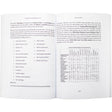









Medical Investigation 101
Medical Investigation 101 trains teens to think like doctors—reading case files, spotting symptoms, and mapping diagnoses. It’s hands-on science with real-world grit, not just another chapter on body systems.
$72.95
$72.97
Save $0.02
Quantity:

Consumable

In a Curriculum Kit

Multiple Grades

Nonreligious

2025 Twelfth-Grade Curriculum Kit
Medical Investigation 101
This isn't your average health class. Medical Investigation 101 hands your teen the stethoscope—figuratively—and drops him straight into the diagnostic process real doctors use. From sore throats to concussions to foodborne outbreaks, students step into the role of investigator, learning to ask the right questions, sort through symptoms, read exam notes, analyze patient histories, and map out treatment options. It's hands-on, think-it-through learning that sticks.
The 247-page textbook lays the foundation: how doctors think, the structure of the medical team, how referrals and specialists work, and how lifestyle choices connect to long-term health. Each chapter walks through realistic case studies that simulate real medical challenges. Students follow each one from the first complaint all the way through to diagnosis and treatment—learning the logic, vocabulary, and problem-solving doctors rely on.
Pair it with the 264-page workbook, and now he's not just reading—he's labeling anatomical diagrams, solving vocabulary crosswords, constructing sentence definitions, and completing workups that would make any med student sweat (in a good way). Interview assignments and writing prompts help connect theory to real life. A teacher's edition is included with complete answer keys and teaching notes to make your job easier.
Even if your student has zero interest in becoming a doctor, he'll still walk away with a solid understanding of how the body works and how medical decisions get made. And because the course builds serious analytical and science-based reasoning, it's recognized as a ½ credit in high school science.
From diagnosing patients to decoding symptoms, it's a crash course in thinking like a doctor—even if your teen never plans to wear the white coat.




